 Petzlover
Petzlover Schweizer Laufhund is originated from Switzerland but Tenterfield Terrier is originated from Australia. Schweizer Laufhund may grow 28 cm / 12 inches higher than Tenterfield Terrier. Schweizer Laufhund may weigh 10 kg / 22 pounds lesser than Tenterfield Terrier. Both Schweizer Laufhund and Tenterfield Terrier has almost same life span. Both Schweizer Laufhund and Tenterfield Terrier has almost same litter size. Both Schweizer Laufhund and Tenterfield Terrier requires Low Maintenance.
Schweizer Laufhund is originated from Switzerland but Tenterfield Terrier is originated from Australia. Schweizer Laufhund may grow 28 cm / 12 inches higher than Tenterfield Terrier. Schweizer Laufhund may weigh 10 kg / 22 pounds lesser than Tenterfield Terrier. Both Schweizer Laufhund and Tenterfield Terrier has almost same life span. Both Schweizer Laufhund and Tenterfield Terrier has almost same litter size. Both Schweizer Laufhund and Tenterfield Terrier requires Low Maintenance.
 The Schweizer Laufhund is a breed born in Switzerland and sought after by the French and the Italians for their skill at hunting small mammals, especially hare. Mercenaries brought scent hounds from France to Switzerland and cross bred them with the Schweizer Laufhund, thereby influencing and changing the native breed.
The Schweizer Laufhund is a breed born in Switzerland and sought after by the French and the Italians for their skill at hunting small mammals, especially hare. Mercenaries brought scent hounds from France to Switzerland and cross bred them with the Schweizer Laufhund, thereby influencing and changing the native breed.
In 1882 it was established that within the breed of “Swiss Hound” (Schweizer Laufhund) there were five different varieties. At this time a standard was written for each of these five different types. By 1909 the standards were revisited and revised, eliminating the hound of Thurgovie. Then in 1933 it was decided that one standard would cover all the varieties of the Schweizer Laufhund.
The Schweizer Laufhund was a line used to develop many different scent hounds. They are used almost exclusively as hunting dogs and not as family companion dogs. St. Hubert Jura Hound, the rare ancient variety, is still in the hunting parties of Canada and France. The breed existed before any dog breeding written records were kept. In Switzerland from the middle ages on, the Schweizer Laufhund was the only hunting dog in the country until recent times.
Even though they didn’t have any popularity until the European nobility became enamored of them in the middle ages, it is thought by some that they date back to the Roman Empire. In actuality most of their pre- Swiss history has been lost. We do know that through the years the breed has been influenced by cross breeding with Austrian, German and French scent hounds.
He is not recognized by the larger kennel clubs such as AKC or UKC, but by some rare breed associations. The dogs that remain today in the United States, Canada and Europe are still mainly owned by either active or retired hunters. Despite their great personalities, they are still not numerous among family pets.
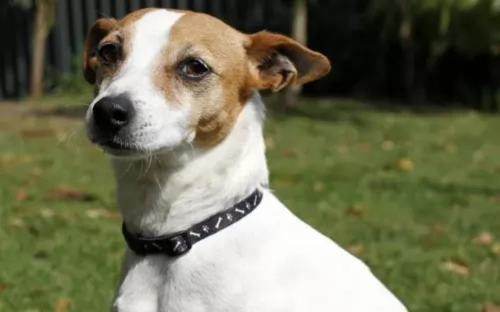 The ancestors of the Tenterfield Terrier came to Australia with the British and from them came this Australian breed. The English terriers were bred to be ratters on the ships to Australia. Today’s breed is a hardy, strong, athletic and agile dog. These first dogs were miniature Fox Terriers, bred for ratting. The miniature Fox Terrier was an established breed in the late 19th century in Australia with families and was know as a Mini Foxie. The breed became a steady presence in homes by the 1920’s.
The ancestors of the Tenterfield Terrier came to Australia with the British and from them came this Australian breed. The English terriers were bred to be ratters on the ships to Australia. Today’s breed is a hardy, strong, athletic and agile dog. These first dogs were miniature Fox Terriers, bred for ratting. The miniature Fox Terrier was an established breed in the late 19th century in Australia with families and was know as a Mini Foxie. The breed became a steady presence in homes by the 1920’s.
The breed might not have been named after the area of Tenterfield as many have guessed. Instead they may have been named after a breeder. The owner of the Tenterfield saddlery was called Tenterfield Saddler and he owned several of the breed. In 1990, Don Burke, a television personality suggested the breed be named the Tenterfield Terrier.
The Miniature Fox Terrier Club of South Australia. Now there were several clubs in Australia and a lot of disagreement about exactly what type of dog a miniature fox terrier was. Some did not think the name was legitimate, but they wanted recognition from the Australian National Kennel Club (ANKC). So, they became the Tenterfield Terrier Club of Australia in 1993. They were recognized by 2002.
Today the breed standard for the Tenterfield Terrier is different from the one for the Miniature Fox Terrier. They are now entirely separate breeds. In addition to the ANKC, the breed is recognized by the New Zealand Kennel Club but not by the AKC. It is also recognized by the American Pet Registry, Inc, the American Canine Registry and the Dog Registry of America, Inc.
 A medium sized dog with good endurance and strength. Its head is lean, and its muzzle is long making this a very noble looking breed. Each of the 5 varieties has some of its own characteristics. They all have short, fine hairs on their ears and heads and longer hairs on their legs and back.
A medium sized dog with good endurance and strength. Its head is lean, and its muzzle is long making this a very noble looking breed. Each of the 5 varieties has some of its own characteristics. They all have short, fine hairs on their ears and heads and longer hairs on their legs and back.
• Bernese – White with a black saddle or black patches and tan on the ears and face.
• Lucernese – Because they have white and black hair mixed across their bodies, they appear to be “blue”.
The Schweizer Laufhund come in miniature and standard sizes fitting into the same standard. Weight has a lot to do with the gender and height of the individual dog, they are longer than they are tall. As a scent hound, the breed is muscular and sturdy. They carry their long tails in a slight curve with a taper at the end.
Despite the different colors in the different varieties all of the breed have black noses, long droopy ears, and oval, brown eyes. They have a soft, calm and gentle facial expression.
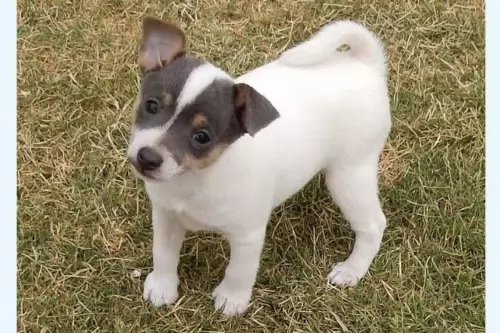 The Tenterfield Terrier is square and compact. He has a head shaped like a wedge and unusual in the terrier group. They have pricked ears and are predominantly white mixed with tan or black. They could also be tri-colored in black/tan and white or tan/liver and white. They have naturally occurring bob tails or docked tails. The nose is usually black unless the dog is liver colored, they have liver noses. The jaws are strong, and lips are tight with a strong neck.
The Tenterfield Terrier is square and compact. He has a head shaped like a wedge and unusual in the terrier group. They have pricked ears and are predominantly white mixed with tan or black. They could also be tri-colored in black/tan and white or tan/liver and white. They have naturally occurring bob tails or docked tails. The nose is usually black unless the dog is liver colored, they have liver noses. The jaws are strong, and lips are tight with a strong neck.
 1Children friendliness - they can be very gentle and loving with children. Toddlers might remind them of prey, however.
1Children friendliness - they can be very gentle and loving with children. Toddlers might remind them of prey, however.
4.Learning ability -their learning ability is high, but they can be very stubborn.
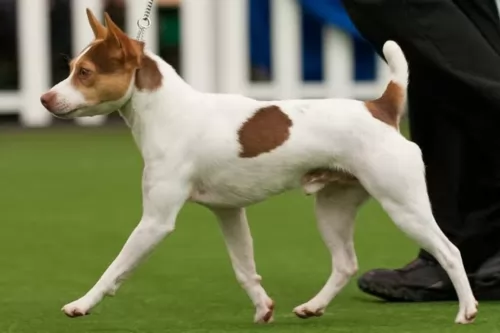 3.Adaptability – they need space even though they are small. They need a lot of exercise. They can adapt if they get another exercise. They can live in apartments and can play indoors as well as out.
3.Adaptability – they need space even though they are small. They need a lot of exercise. They can adapt if they get another exercise. They can live in apartments and can play indoors as well as out.
4.Learning ability – They are extremely intelligent, but they can be stubborn like all terriers.
 There are a few health issues that the Schweizer Laufhund is prone to. As an ancient breed there is not a lot of genetic evidence of breed health issues but there is more recent reporting.
There are a few health issues that the Schweizer Laufhund is prone to. As an ancient breed there is not a lot of genetic evidence of breed health issues but there is more recent reporting.
• PRA (Progressive Retinal Atrophy) – hereditary – can result in blindness.
• Ectropion and Entropion – eyelid misalignments either inward or outward. Can be corrected with surgery.
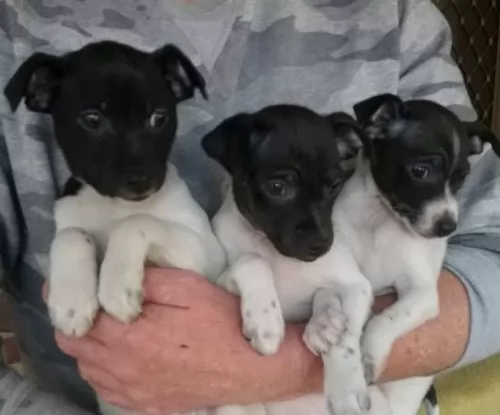 They are small in stature and because of their face they seem to have dental issues. The breed does not have a lot of health issues but deals with the same issues as many small terriers. Not all members of the breed are susceptible to these, but some are just like the Australian Terrier.
They are small in stature and because of their face they seem to have dental issues. The breed does not have a lot of health issues but deals with the same issues as many small terriers. Not all members of the breed are susceptible to these, but some are just like the Australian Terrier.
 . Feeding the puppy – as an active working breed they should be fed a high quality active or working breed kibble formula.
. Feeding the puppy – as an active working breed they should be fed a high quality active or working breed kibble formula.
2.Feeding the adult - the adult should be fed the same active or working breed formula, only in an adult formulation.
4. Games and Exercises – this active breed does require a lot of daily exercise. Take them on at least one good, quick walk per day and give them a fenced yard to play in. They love hunting training and field trials along with activities like barn hunt. They love to run alongside as you bike or jog.
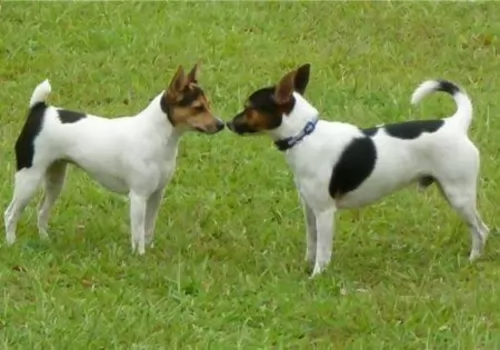 1.Feeding the puppy – Don’t overfeed but do feed high quality puppy food for small breeds and terriers.
1.Feeding the puppy – Don’t overfeed but do feed high quality puppy food for small breeds and terriers.
2.Feeding the adult – This is an active breed but don’t overfeed. Feed a high quality adult dog food for terriers or small breeds. Feed 2 times a day.
4. Games and Exercises – The breed has a high energy level and needs a lot of exercise. He is a terrier and loves to “go to ground”. Play activities that allow him to do that are best. He plays barn hunt, lure coursing and terrier specific competitions.